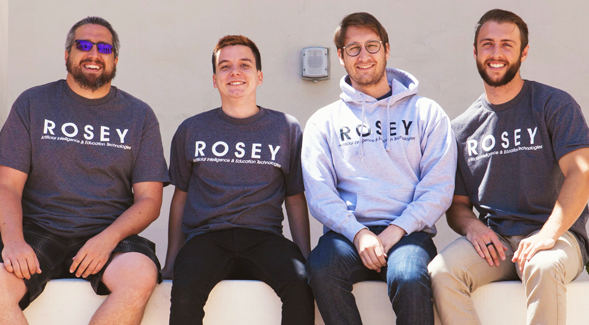Artificial Intelligence Meets Education at SDSU
An artificial intelligence platform developed by SDSU students has the potential to make grading more efficient.

“Software is becoming increasingly integrated into our lives. Our mission at Rosey is to leverage advances in machine learning and artificial intelligence to help students and teachers.”
Artificial intelligence (AI), the trendy technology behind facial recognition, self-driving cars, and virtual assistants in the home, is poised to lighten one of the dreariest tasks in the classroom.
Enter Rosey, an AI platform that trims hours of grading written tests into minutes and provides students with immediate, personalized feedback.
“Software is becoming increasingly integrated into our lives,” said Michael Green, a San Diego State University computer science student and co-founder and CEO of Rosey. “Our mission at Rosey is to leverage advances in machine learning and artificial intelligence to help students and teachers.”
Hours and hours
As a teaching assistant in SDSU’s Department of Computer Science, Green felt frustrated by the hours spent grading papers. What bothered him even more was the lengthy wait time between grading and the students’ receipt of their test scores and feedback.
At the same time, he was completing a data science internship and hoped to combine his knowledge of data science and machine learning to solve some of these problems in education.
“Every student should get a personalized education,” said Green. “I wanted to make something that really adapts to the students and helps them accomplish their goals.”
Green enlisted classmate Logan Lasiter to help him develop the concept behind Rosey, a name selected to bring a touch of warmth to a chore sometimes dreaded for its cold equations. Lasiter became co-founder, and in July 2017, after seeing a demonstration of what Rosey could do, SDSU computer science professor Scott Lindeneau signed on as the company’s CTO.
“Rosey brings that interactivity and responsiveness to students for pen and paper tests,” said Lindeneau. “It is incredibly difficult to write good multiple choice questions that test student knowledge in any meaningful way.”
The app allows for the recognition and evaluation of freely written text, allowing professors to scan the tests with any smartphone or scanning device. Students will receive accurate and timely grades on any of their smart-devices.
“We’ve recently gotten to the point where machine learning is effective enough to tackle some very difficult problems in vision, reasoning, and natural language processing,” said Green. “You can really see that growth in assistants like Google Assistant and Alexa, as well as well as the increasing amount of active research focusing on the area.”
Finding success at SDSU
Just one year after its founding, Rosey was selected as one of the top 50 most innovative AI startups in the CODE_n CONTEST, a prestigious international startup competition. The Rosey team plans to travel to Stuttgart, Germany, in October to pitch their company and meet potential investors. Rosey was also one of TechCrunch Disrupt 2018’s Top Picks and will be showcased at the San Francisco-based event in September.
Despite the company’s early success, Green does not forget how SDSU helped him along his journey as an entrepreneur. The ZIP Launchpad, which helps students and faculty with startups, introduced the team to Andre Hale, a fellow entrepreneur who joined on as the CFO and CMO of Rosey. Hale helped the company secure its first angel investment of $100,000 in November 2017.
“Participating in the ZIP Launchpad’s Experience Track was incredible,” said Green. “The best thing about the program is the people that you meet and the resources they give you.”
Green credits the SDSU community for guiding him as he works toward growing the company.
“SDSU has so many opportunities outside of class to better yourself and learn. The great thing about SDSU is that it exposes you to a bunch of different areas of knowledge and culture, which provides students with an excellent experience unique to the SDSU campus.”



